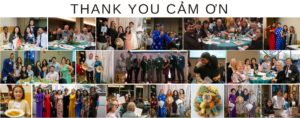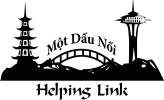
At Helping Link’s 30th Annual Gala our guests were treated to the inspirational and moving words of keynote speaker, Juliet Le. Here are excerpts from her speech.
“We will continue to be free in our doing” – Thich Nhat Hanh
Xin chào tất cả moi ngoui đến đây tối nay. Tên con là vi Juliet Le. tên mẹ con là lanchi le. ba tên là duc nguyen. Chi tên là Julie Nguyen. Good evening and thank you to each and every one of you for joining us tonight. My name is Vi. My friends call me Juliet, Juju and Lil J. My mom’s name is Lanchi Le. My dad’s name is Duc Nguyen. And my sister’s name is Julie Nguyen. Thank you to my parents, my ancestors, my spirit guides and those who have made it possible for me to be here today. I stand on the shoulders of those who come before me and I am committed to working for a better world for those who will come after.
I would like to acknowledge that we are on the traditional land of the first people of Seattle, the Coast Salish and Duwamish People—both past and present—and honor with gratitude the land itself and the Duwamish Tribe.
Helping Link’s work is deeply intertwined to the story of my family, like so many of you in this room. My leadership story always starts the same way. I am most fundamentally shaped by my experience as a first-generation proud daughter to immigrant and refugees. I learned early on how racism and poverty keep families from living a dignified life. I know that our safety lies in our relationships and community, not money or material objects. We must know that at the core of freedom, it must require authentic relationship and love. And so the stories I share tonight are a reflection of the love I’ve seen in my family, sometimes with no words even needed.
I remember me, my sister, mom and dad getting into my dad’s truck early in the morning. I was probably 5 years old. We were headed to one of his landscaping jobs. What I remember most was not the lavish, large perfectly cut grass my dad would work on; it was not the home perched up against the yard that could fit an entire village, but it was of his hands. The hands of someone who had survived so many things people should never have to survive. Wars. Leaving your home behind. Migrating across the vastness of the ocean on a tiny boat not big enough to carry all the people that it did. When the landscaping job was over, which felt like a million years, we would jump back into the truck and head home, but the drive there and back was the best because I was so small that I would bring a blanket and make a fort by my mom’s feet in the passenger side seat. The heat would go straight into my little nook and it always felt like a magical portal. I’d fall asleep and woke up back at my house like it was all a dream.
And then there was my mom, my greatest teacher. You wouldn’t know by looking into her light brown eyes that she has an invisible disability in those very eyes. Diagnosed with a genetic disease called retinitis pigmentosa, a condition where the depths of your vision gets dimmer and dimmer, it’s a miracle my mother can still see during the day and it has not stopped her from making the most fire ca kho and cảnh chùa (braised catfish and sweet and sour soup.) The wisdom and compassion that have been passed down from my mom led me to work in community with grassroots nonprofit organizations at the intersections of many issues such as: immigrant and refugee justice, those who are currently and formerly incarcerated, environmental justice and disability justice. However, my time working in the nonprofit sector both in Vietnam and in the U.S. has made me become disturbingly aware of the deep barriers that exist within this sector, particularly around the lack of resourcing of the work and resourcing of the people actually doing the work. Growing up in a poor-working class family, I never imagined that I would be working for a family that has generational wealth and that I would be a steward in moving that wealth back into community. I made a conscious decision to make the move into philanthropy to understand the way money moves and how grantmaking decisions were made.
Through my work as a Program Officer at the Satterberg Foundation, I have had the privilege to support the return and redistribution of wealth to more than 200 organizations, accounting for $50 million on annual basis of multiyear unrestricted funding. This work is relational. It must be. We do this through a trust-based approach. The history of the unequal distribution of wealth in the U.S. is a history of racism—it is impossible to separate the two. By acknowledging this in the philanthropic sector, we can fundamentally change the way we choose to move money and how to repair and heal our communities. I have had the honor to build a myriad of relationships on the ground with transformative social justice movements and have witnessed what is possible when individuals and organizations are abundantly resourced. These issues are deeply connected and require systemic cultural, policy, institutional shifts, reparations and a radical reimagining of society. My experience organizing and resourcing social movements led by Black, Indigenous and People of Color, poor and working-class communities, women and queer and trans people are our best hope to transform toward a more just society.
Helping Link is an organization that shines hope in our community despite the historical lack of investment in the Vietnamese community.
I am grateful to have been connected to this work and to Minh-Duc over the last five years. This remarkable organization understands the unique struggles faced by immigrants and refugees and offers them vital support, resources and sense of belonging. Whether it’s language classes that empower individuals to communicate effectively, citizenship and job training programs that open doors to economic independence or technology classes to create more ease in their life and help them stay connected with their loved ones. Helping Link is a lifeline for those navigating the complex terrain of a new life in a new land and provides resources on how to navigate the barriers in the system. However, what truly sets Helping Link apart is its capacity for empathy and understanding. It recognizes that behind every immigrant and refugee is a story—a story of resilience, determination and what is possible when people are set up to thrive. My parents’ journey, like that of so many others, is a testament to the strength of the human spirit.
Let us recognize that our diversity is our strength and that by supporting organizations like Helping Link, we are building a more inclusive, compassionate and equitable future for all.

